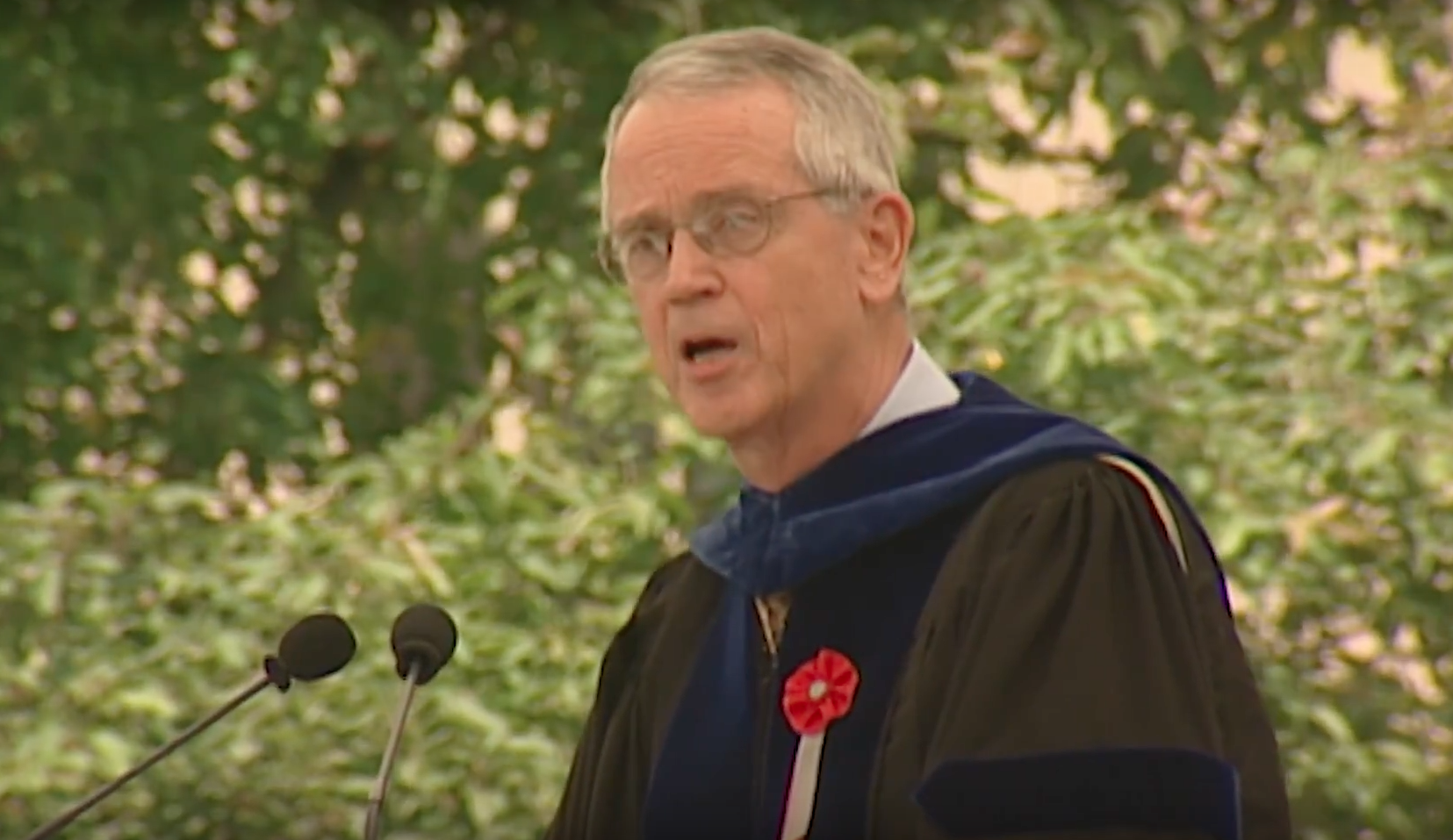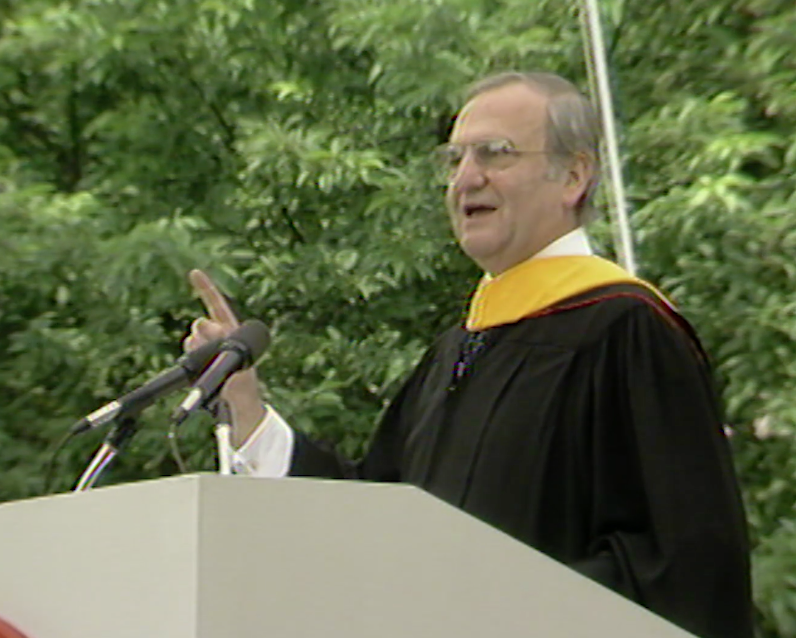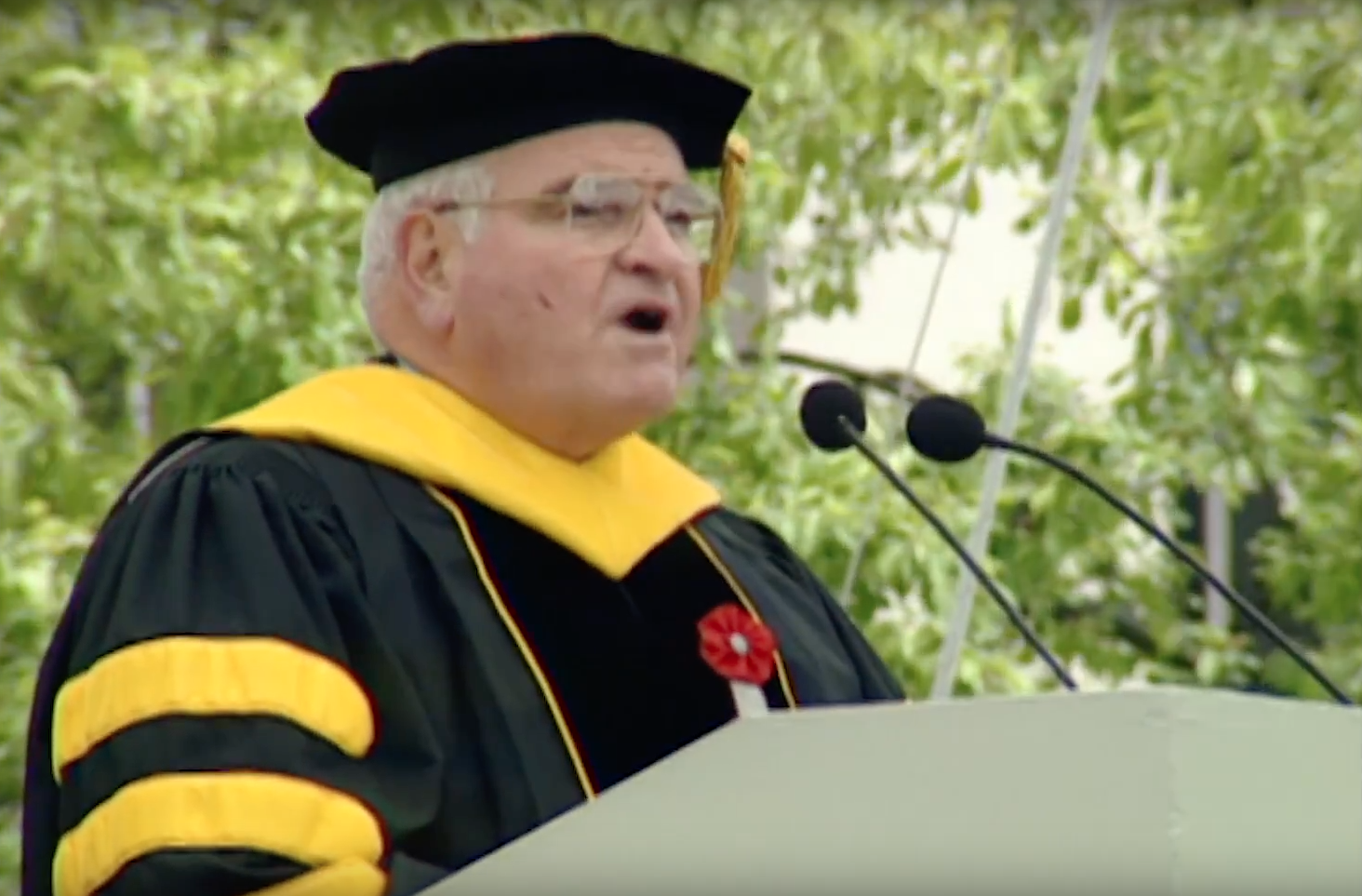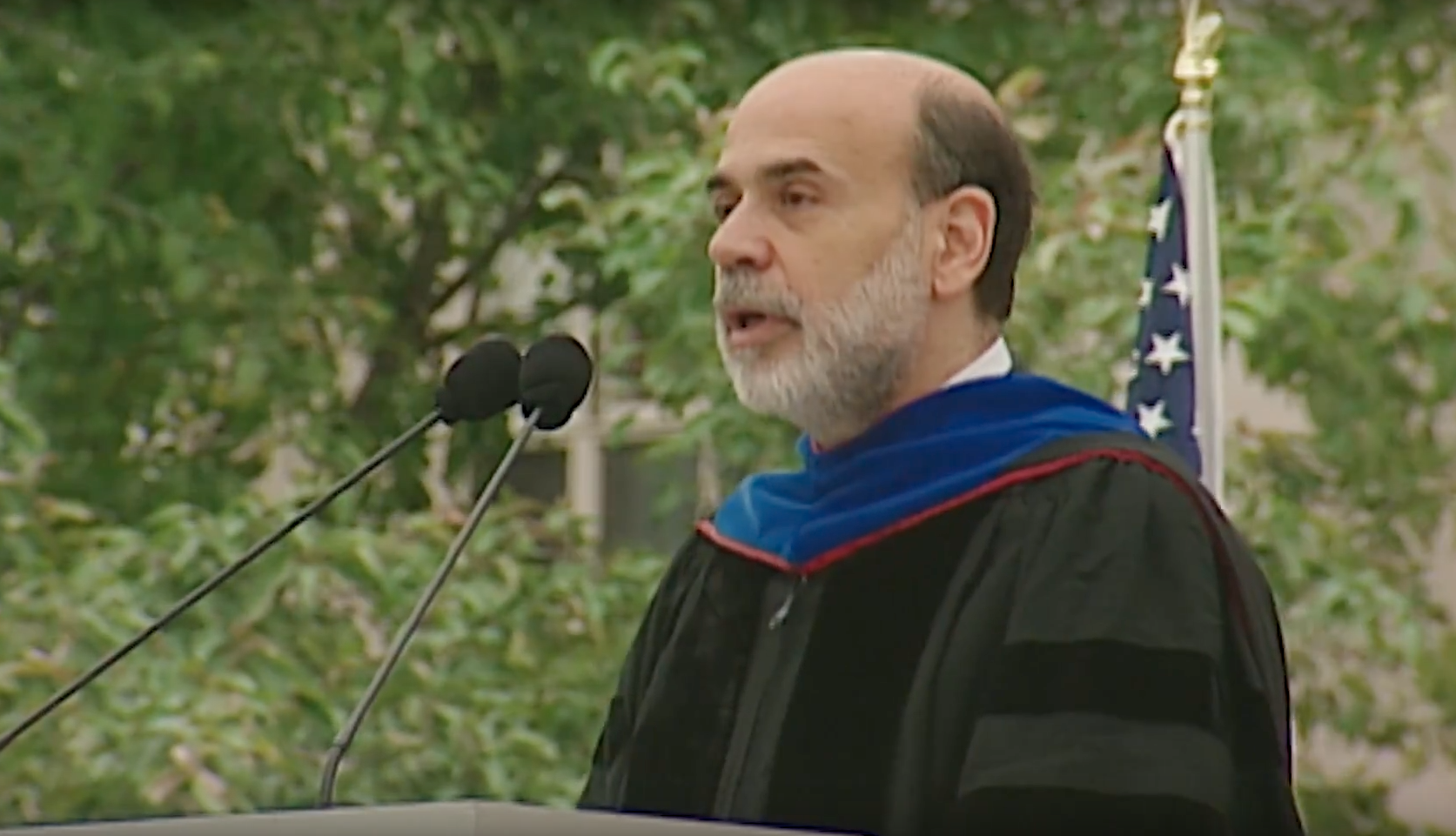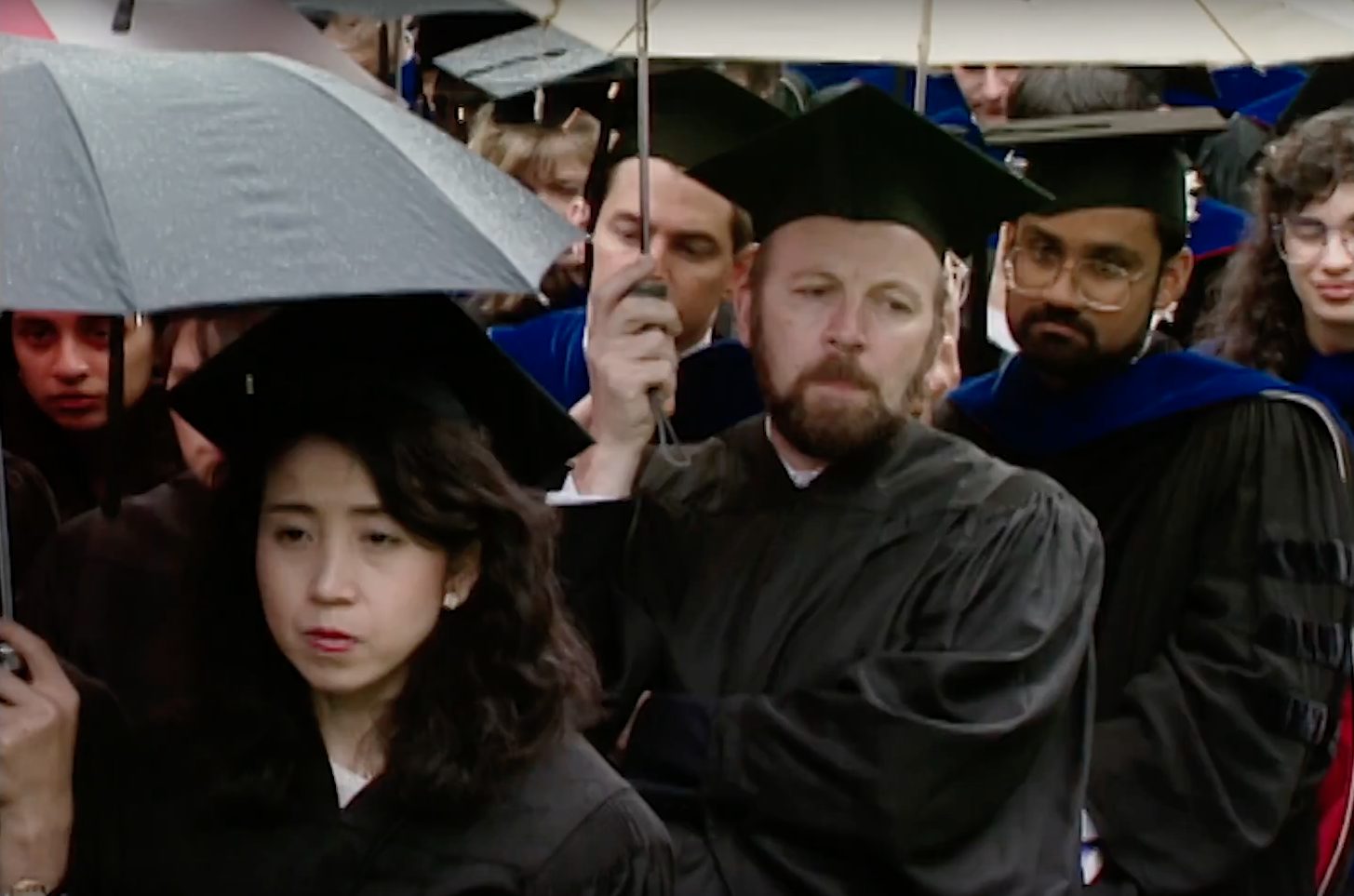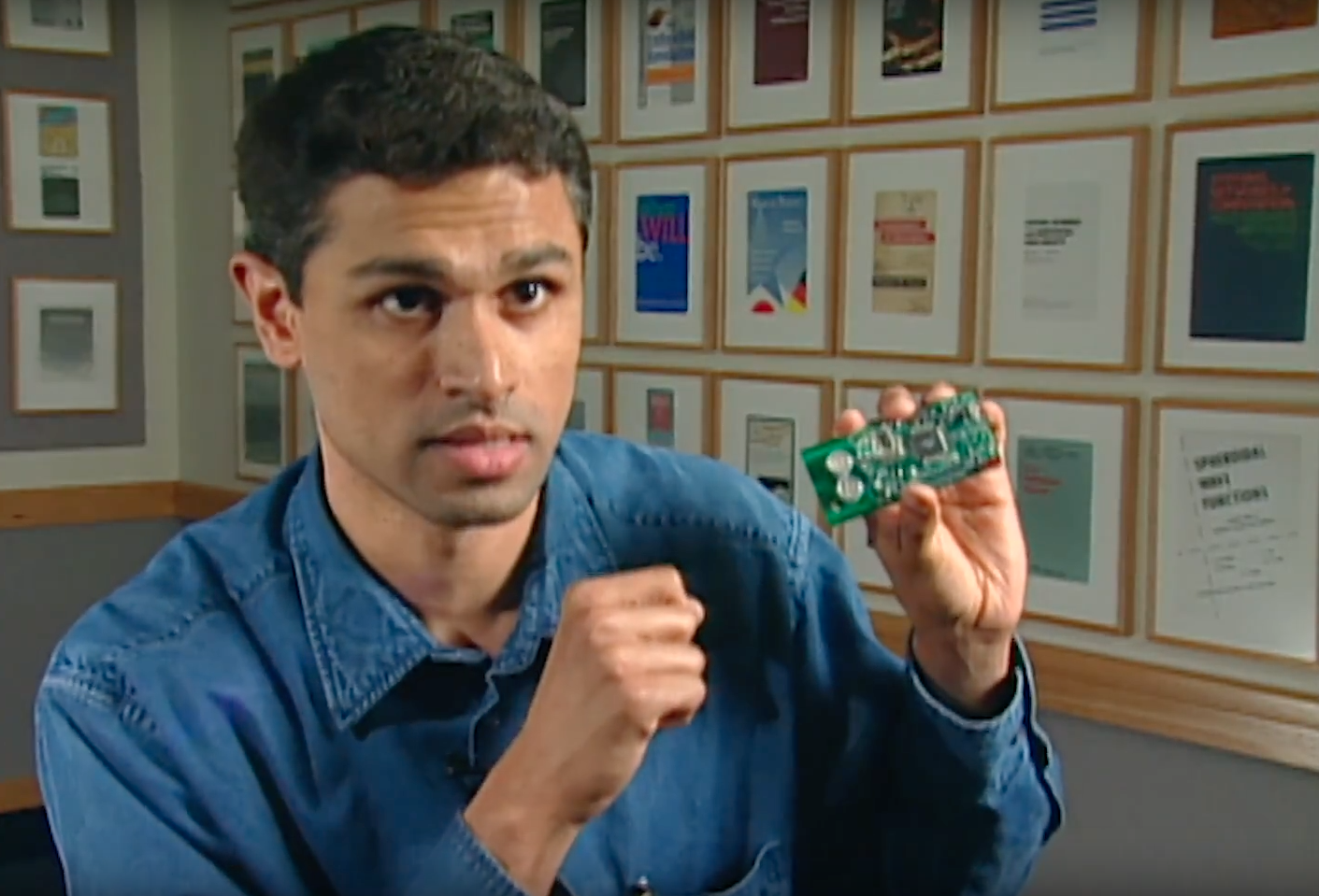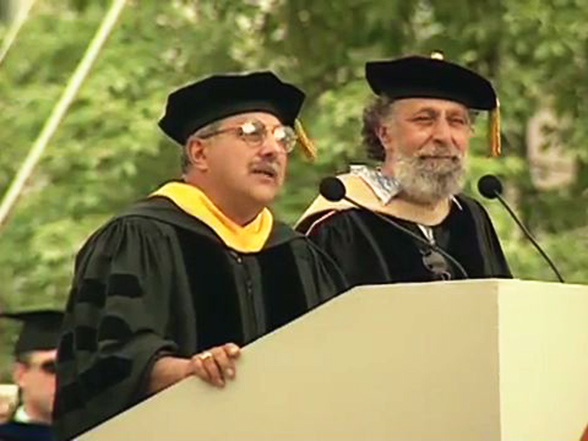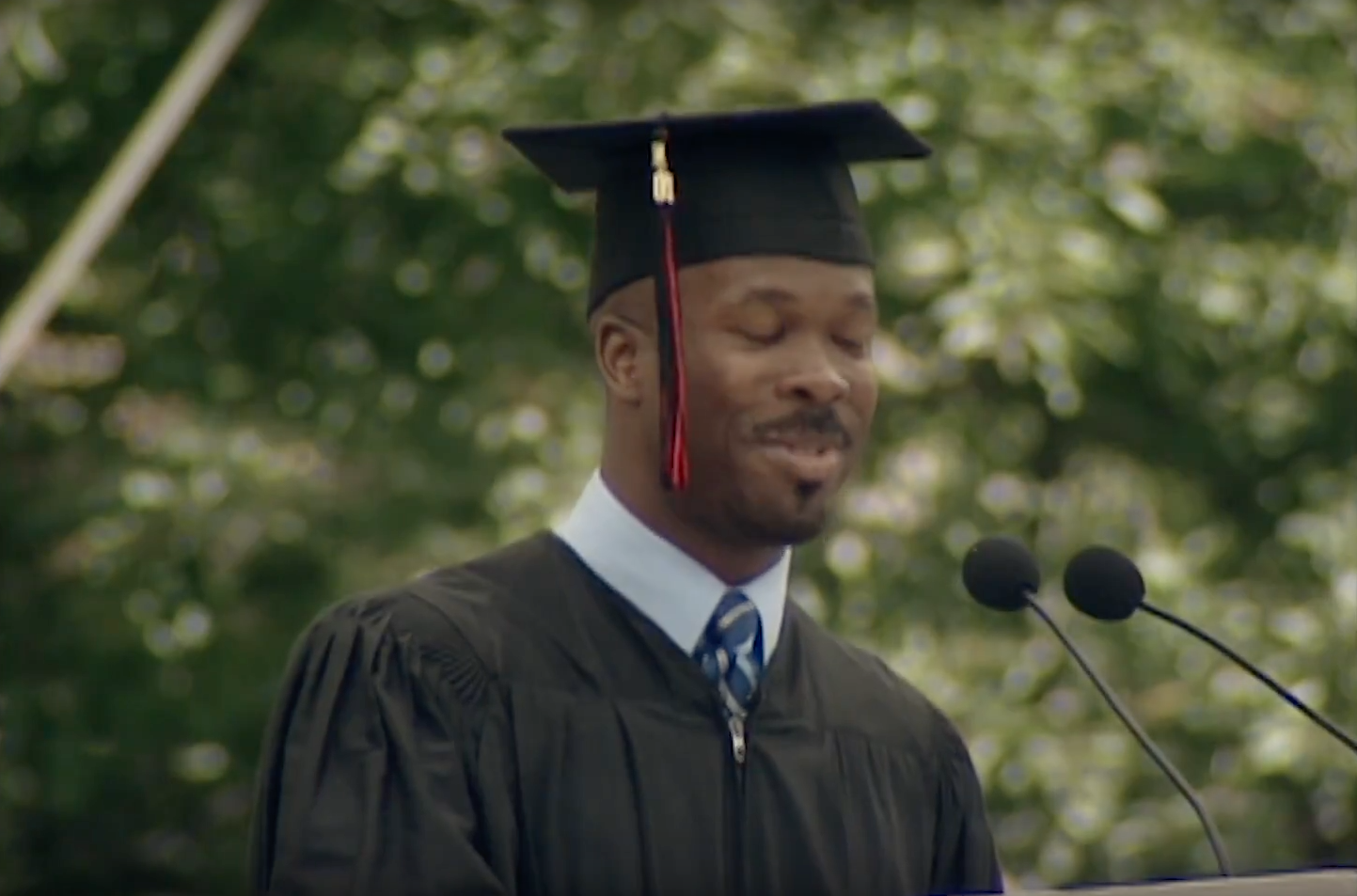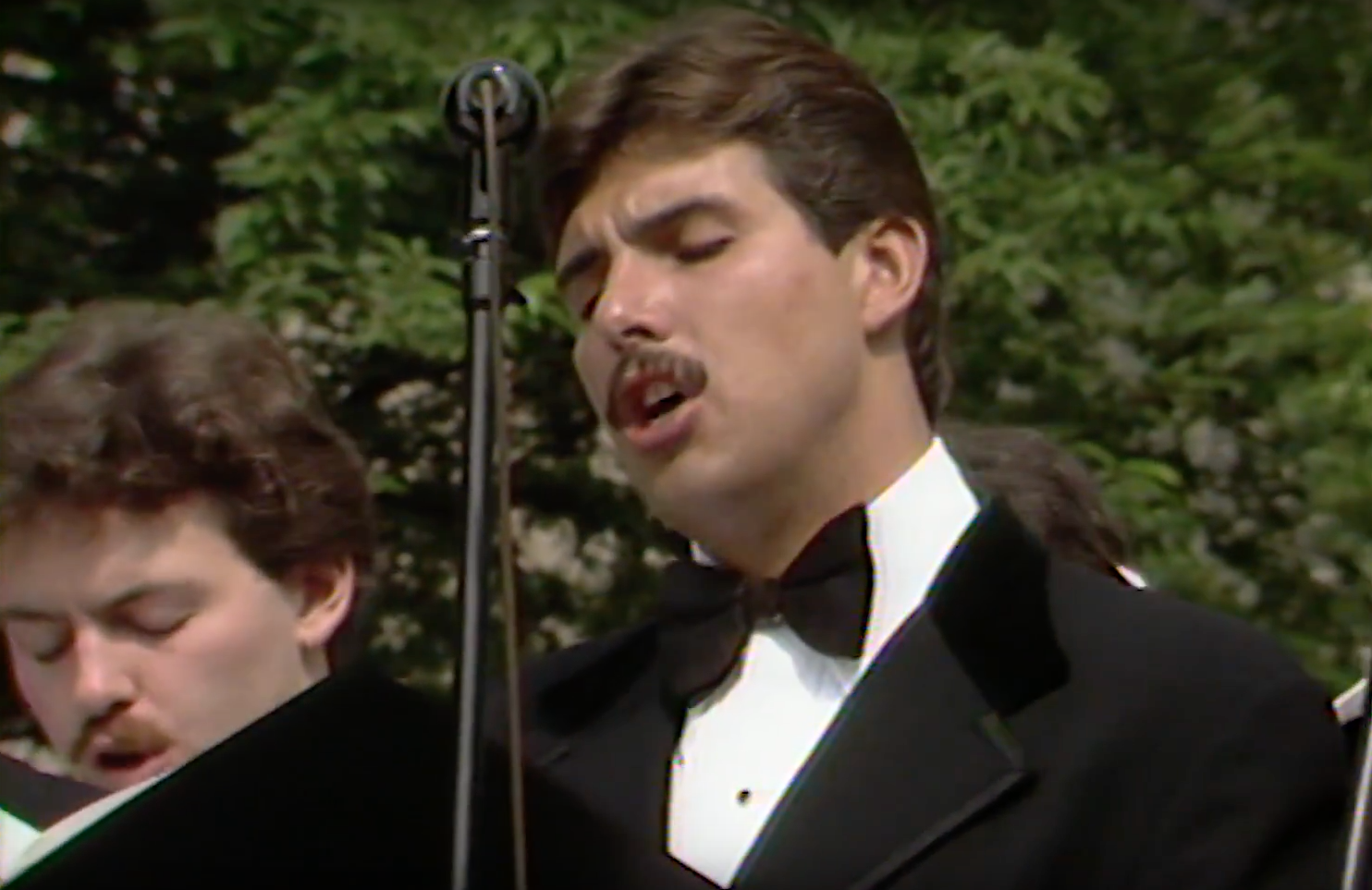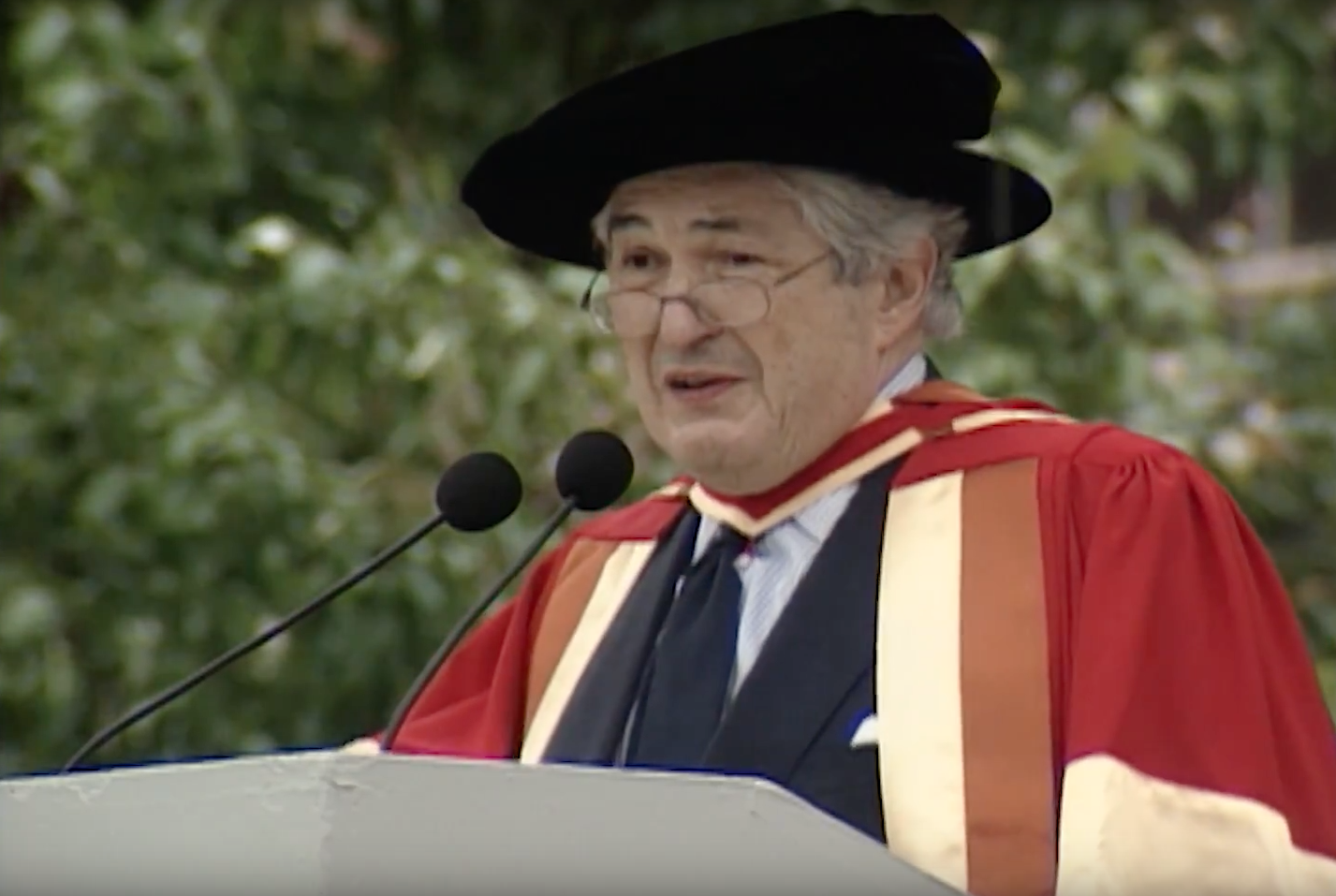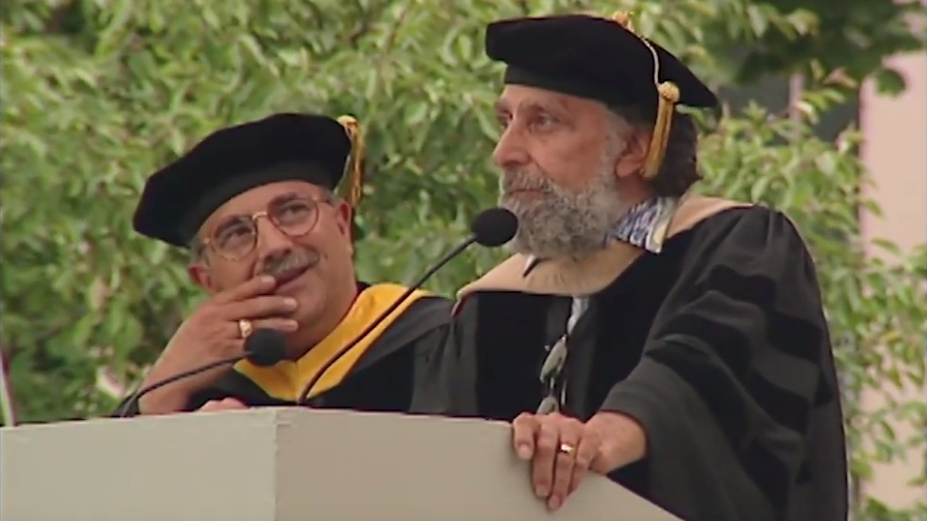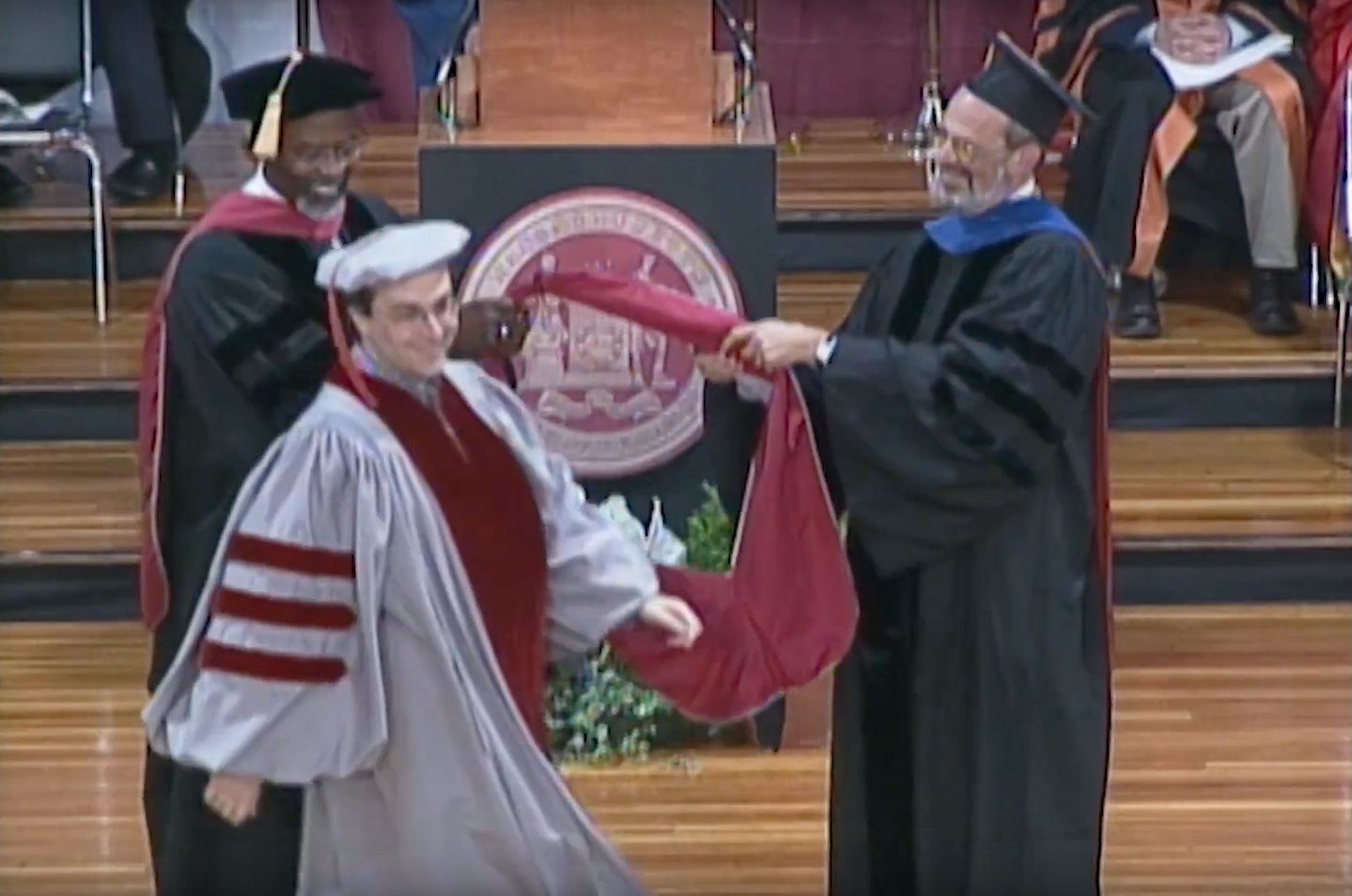MIT Commencement Program 1994 - Includes Address by His Highness Karim Aga Khan IV
[MUSIC PLAYING]
[MUSIC - EDWARD ELGAR, "POMP AND CIRCUMSTANCE"]
PRESENTER: Ladies and gentlemen, the guests of honor, the class of 1994.
[MUSIC PLAYING]
GRAY: The corporation and the faculty of the Massachusetts Institute of Technology are now declared convened together with this assembly on this glorious morning in Cambridge on the occasion of the commencement exercises of the Institute for the conferring of its degrees. The stage assembly and audience will please rise and join Professor Ellen Harris, associate provost for the arts, in the singing of one verse of "The Star-Spangled Banner," to be followed by the invocation by the Reverent Scott Paradise.
[MUSIC - "THE STAR-SPANGLED BANNER"]
HARRIS: [SINGING] O, say, can you see, by the dawn's early light, what so proudly we hailed at the twilight's last gleaming, whose broad stripes and bright stars, through the perilous fight o'er the ramparts we watched were so gallantly streaming? And the rocket's red glare, the bombs bursting in air, gave proof through the night that our flag was still there. O, say does that star-spangled banner yet wave o'er the land of the free and the home of the brave.
[APPLAUSE]
PARADISE: Let us pray. Oh, holy God, creator of all things. We offer thanks with hearts overflowing for the privilege to live and work in this place, for the opportunity to learn, for the experiences of testing, which try us as silver is tried. For friends and mentors, for the excitement of ideas, the joy of discovery.
Oh, God of justice and love, we find the world shaped not only by human achievements, but also by human failures. We have ended the Cold War and reduced the nuclear threat. But we see violence proliferate in families, on the streets, in oppressive regimes, and in civil wars around the globe.
We have created great wealth, but we have acquiesced to great poverty. We have awakened as a nation to the environmental crisis, but we have been unwilling to make the changes necessary to resolve it.
Oh, God, giver of life and hope, we commit ourselves to a renewed sense of vocation. May we realize that even the smallest deeds of love and justice and generosity can change history. May we learn to risk speaking the truth when evil is being done and all are silent.
May we work less on the problems of the powerful and the prosperous and more on the needs of the poorest, the weakest, and the most vulnerable of our brothers and sisters. May we together blaze a path toward a world at peace with itself and reconciled with the earth.
Oh, God, our companion on the way, be with us as we go forth from this place. Give us hope for the future and joy in our hearts. Amen. Please be seated.
GRAY: I'm pleased to welcome to the platform this morning the honorable Kenneth E. Reeves, mayor of the city of Cambridge.
[APPLAUSE]
It is my privilege to welcome his highness, The Aga Khan, spiritual leader of the Shia Ismalli Muslims. His highness The Aga Khan will now present the address.
[APPLAUSE]
KHAN: President Vest, members of the corporation of the Massachusetts Institute of Technology, distinguished members of the faculty, Mayor Reeves, happy graduates, even happier parents, and others gathered here today, I am pleased and honored to be with you this morning.
MIT has shown a standard of excellence in education and research that sets a benchmark for universities everywhere. You who have been at the Institute for years may be excused if you take this in stride. But for me, coming here for the first time in several years, the energy of the place is palpable.
Actually, my reaction is somewhat personal. When as a young man I began to think about colleges, MIT was my first choice. In the end, I acceded to the advice of my grandfather, who favored Harvard.
[LAUGHTER]
In fact, I didn't even apply anywhere other than MIT. And MIT accepted me on the basis of my grades. They didn't even ask me to take an examination, which is good, because I could hardly understand written English. When my grandfather told me I shouldn't didn't enroll here, I was devastated. That really put the kibosh on my plans to study science. You see, I learned Harvard English.
[LAUGHTER]
Education has been important to my family for a long time. My forefathers founded Al-Azhar University in Cairo some 1,000 years ago at the time of the Fatimid Caliphate in Egypt. Discovery of knowledge was seen by those founders as an embodiment of religious faith and faith, as reinforced by knowledge of workings of the creator's physical world.
The form of universities has changed over those 1,000 years. But that reciprocity between faith and knowledge remains a source of strength. MIT has changed also over its 130 years. This university was initially designed to meet the needs of society in a newly industrialized world. As the world and its needs evolved, so has MIT's curriculum.
Steadily, the emphasis on social sciences and humanities has expanded as the Institute has recognized increasingly that the range of technologies that are needed to solve societal problems goes far beyond those of engineering and natural sciences. The increased richness of education results in an increasingly versatile set of graduates.
As I look out over those today who are here, I see that MIT has changed in other ways. The great continents of the world are now represented in your student body and in your faculty. So too are the great religions of the world. MIT seems prepared to take advantage of excellence from all quarters. A fact that is sure to reinforce the Institute's future strength.
When I was thinking about the theme that I should choose for this talk, I considered first that commencements are occasions to reflect on general truths, truths that will retain their validity over the course of your lives and over a wide range of intellectual interests that you graduates embody. But how is that search for generality to be squared with the very particular point in time that today represents?
You and I are here in a real sense only because 1994 finds MIT and the world at distinctive stages of their evolution. Still, the particular can provide insight into the general. So my comments today will draw on the particular in the hope of saying something of value about the general.
I shall talk today about encounters, encounters when two people meet or two particles or two cultures. In that crucial moment of interaction, the results of an encounter are determined. In the simplest of encounters, say, with two billiard balls, the outcome is a predictable result of position, velocity, and mass.
But the encounters that interest me most are not so simple. In the encounters of people and cultures, much depends on the path that each has taken to that point. These are not stochastic processes. The subjects have histories. The encounter has complexity and rich dimensionality. The result of an encounter between two people or between two cultures is shaped by the assumptions of each, by their respective goals, and perhaps, more directly relevant to a university, by the repertoire of responses that each has learned. Encounters, therefore, have aspects of both the general and the specific.
What makes our current time distinctive are the new combinations of people and cultures that are participating in these encounters. Two ongoing social and political changes illustrate the reasons for these new combinations. The first is the collapse of communism in the USSR and Eastern Europe. You graduates may feel that you've been at MIT forever. But it really is remarkable that the overturning of the communist world has occurred since most of you started your studies here. You go out into a world where the rules are different from those that held when you entered.
Colonialism is moribund. No longer is it enough to decide whether one is aligned with communism or capitalism in a bipolar world. Now a full range of complicated choices is opened up to people in the developed and the developing world alike. A massive break on change has been released.
The potential for creative action, creative encounters, is now much enhanced. This change is a work in progress, however. The potential of the moment must be seized, for conditions for change may not always be so propitious. There is the real possibility that the Soviet Union may reconstitute itself if the social upheaval that accompanies political disintegration and economic reform is allowed to become less tolerable than the strictures of a totalitarian state.
While these shocks reverberate from the ex-communist bloc, profound changes of a very different character are to be found in the Islamic world. Here the changes are in both perception and reality. And both of them are works in progress, too. The Islamic world is remarkably poorly understood by the West, almost terra incognita. Even now, one sees pervasive images in the West that caricature Muslims as either oil sheiks or unruly fundamentalists.
The Islamic world is, in fact, a rich and changing tapestry which the West would do well to understand. The economic power of the Islamic world is increasing, not so much because of Middle Eastern oil, but because of the rapid growth of newly industrializing countries like Malaysia and Indonesia.
Its population is increasing and already represents nearly one quarter of the world's total. It is remarkably diverse, ethnically, economically, politically, and in its interpretations of its own faith. The Muslim world can no longer be thought of as a subset of the developing world. Islam is well represented in the United States, Canada, United Kingdom, and Western Europe. And that presence is growing.
The religious diversity of Islam is important and misunderstood by most non-Muslims. This is not the forum to go into the multiple reasons for this misunderstanding. But for many in the West, the first awareness that there were two major branches of Islam, Shia and Sunni, only came with the Iranian revolution.
That represents a superficiality of understanding that would be as though we Muslims only just learned that there were two branches of Christianity, Protestant and Catholic, and had no understanding of the Reformation, the authority of the church, or the ideas that led to the proliferation of Protestant sects in the 16th and 17th century. Or as though we thought that most Americans were Branch Davidians.
In the face of such lack of knowledge, about one quarter of the world's population, one may reasonably ask what the role of the university is in setting this straight. It seems clear to me that at the most basic level, the university is responsible for helping its students to learn not only the simplifying principles that the various learned disciplines found useful in understanding our world, but also the rich complexity of history and language and culture that make real-life problems interesting and difficult.
MIT now teaches both of these lessons well and vigorously. But it seems not always to have done so. Indeed, I am told that at the opening of MIT in 1865, one local newspaper reported with a note of triumph that the creation of MIT, quote, "sealed the fate of that system by which our youth waste the best portion of student life in burrowing into the grammars and dictionaries of races less enlightened than their own," unquote. MIT has clearly come around to thinking that those less enlightened races have something to teach. And that teaching helps the university fulfill its potential.
I would argue, however, that the university's potential is met not just in developing the intelligence of its students but also in bringing them to understand the importance of engaging themselves in solving the problems of the world. The great political and social changes around us are creating opportunities for service that promise to be deeply rewarding to persons with the engaged intelligence to be successful at important but difficult work.
Let me take one example to illustrate the challenging encounters to which today's graduates might apply their intelligence. Tajikistan is a mountainous country in Central Asia of five million people, more than 90% Muslim. As a republic in the former Soviet Union bordering China and Afghanistan, it had a strategic importance that dwarfed its natural resources.
The Soviet Union, therefore, invested heavily in Tajikistan, building roads and power stations, supplementing food supplies and equipment, developing the education and health systems. The result was a highly educated, sophisticated, but largely rural population that managed its affairs well at home by the rules of the game at that time and provided well-developed human resources for export to other parts of the Soviet Union.
With the fall of the Soviet Union, things changed for Tajikistan. Subsidies, which had provided most of the republic's budget, and for the remoter parts, 80% of the food supply, were cut off. The result has been hunger, shortages of fuel and clothing, and deep uncertainty about the future.
Long suppressed ethnic tensions between indigenous tajiks, neighboring Uzbeks and Kyrgyz, and immigrant Russians, amongst others, became more evident as groups jostled for political and economic control. Religion emerged from private houses, where it had been practiced covertly for 60 years, to become a manifest force.
Tajikistan has become the focus of one of the most interesting encounters of the day. It is here and in other Central Asian republics that the three great cultures encounter each other-- the communist world, the Muslim world, and the Western world. It is here that those three cultures could forge a success that would contrast starkly with the brutal failure in Bosnia.
The result of the encounter in Tajikistan may determine much about the way history unfolds over the coming decades. So it is worth thinking a bit about the stance that each of these cultures might take in preparing for this encounter. That thought might lead one to ask what it would take for this or any encounter to be constructive.
I suggest that there are four prerequisites for success. For each of the cultures, the result should first draw on its strengths and second be consistent with its goals. Third, the result should be a sustainable improvement in the current situation. And fourth, the transition should be humane.
Each of these three cultures has something to bring to the solution of the problems of Tajikistan. The West has many strengths. But prominent among them are science and democracy with their public mechanisms for self-correction and also private institutions, liberal economics, and their recognition of fundamental human rights.
The Muslim world offers deep roots in a system of values, emphasizing service, charity, a sense of common responsibility, and denying what it sees to be the false dichotomy between religious and secular lives. The ex-communist world, although it failed economically, made important investments in social welfare with particular emphasis on the status of women and was able to achieve in Tajikistan impressive social cohesion.
Just how to combine these competencies, to solve Tajikistan's problems, is not clear. But if the outcome is to be sustainable, it seems necessary to concentrate resources on the development of private institutions, of accountable public institutions, and of human potential. But how to get from here to there without inflicting cruel damage on the people already buffeted by shortages and change?
Again, the way is not entirely clear. But one should strive to retain the powerful ties of mutual support that in different ways bind individuals together in Muslim and communist societies. And one should see that the impressive gains in health and education are not lost in the transition, for it would be unconscionable to allow, for example, the equality of men and women that has been achieved in Tajikistan over the last 60 years to be erased in the transition to a market economy.
These are the prerequisites that I hope the representatives of these three important cultures will keep in mind as they have their own encounter over Tajikistan. If the encounter of the Muslim world, the West, and the ex-communist world takes account of the need for each to draw on its own strengths, to be consistent with its goals, to strive for a sustainable, improved outcome, and to ensure a humane transition, then the encounter have been as successful as it is important. Indeed, the importance of Tajikistan has, if anything increased in recent years as events in neighboring countries continue to remind us.
Turning back to today's graduates, I hope that these four prerequisites applied equally to the encounter that you are just completing with MIT. Knowing the quality of faculty and students here, I have no doubt that the encounter between you and the faculty has drawn on your respective strengths. I hope each of you kept consistent with your goals, even as they may have evolved over your time here.
The quality and sustainability of the outcome will be determined over the course of your lives. But reading the smiles amongst the graduates, I judge that the transition, your time at MIT, must have been tolerably humane.
In conclusion, I would recall the words of former MIT President James Killian Jr, quote, "We need better linkages between science and humanities with the object of fusing the two into a broad humanism that rests upon both science and the liberal arts and that does not weaken either. We need bifocal vision to thread our way among the problems of modern society," unquote.
That need to use the power of complementary academic disciplines remains true today. What is now clear is the need also to draw on the wisdom of different cultures in solving those problems. Thank you, and please accept my best wishes for a lifetime of constructive encounters. Thank you.
[APPLAUSE]
GRAY: Your highness, thank you very much for your insightful and challenging comments on encounters human and cultural. And thank you so much for gracing this commencement 36 years after you might have been at another commencement had your grandfather not intervened.
Now Mr. Caryl Brown, president of the Graduate Student Council, will give a salute to MIT from the graduate student body. Following this, Ms. Ann Chen, president of the senior class, will present the class gift to President Vest. After Ms. Chen's presentation, president Vest will deliver his charge to the graduates.
BROWN: Thank you Dr. Gray. In presenting the graduate students' salute to MIT, I want to speak in terms to which students can most easily relate. I don't watch Star Trek-- The Next Generation, so I'll employ another familiar approach modeled after Dave Letterman's Top 10 List.
So without further delay, the top five reasons for students to salute MIT. Number five-- only at MIT can you experience the joy and thrill of turning in a 200-pound thesis for a quarter ounce receipt.
[LAUGHTER]
Number four-- MIT supports an approach to learning and research that is laid back, relaxed, and carefree.
[LAUGHTER]
Number three-- MIT continually strives to break down barriers and push limits in all areas-- technology, science, diversity, and tuition cost structures. Number two-- our campus police patrols the lows and highs of this wonderful campus on which we work and live.
[APPLAUSE]
And the number-one reason to salute MIT-- we are the premier engineering and science institution in the world, not to mention Sloan is now ranked ahead of that little business school up the river.
[CHEERING]
Graduates, when times get tough out there, just remember all of the truly rewarding experiences and relationships you have had while at MIT. They will serve you well. Congratulations and good luck always.
[APPLAUSE]
CHEN: I remember the last time all of us, the class of 1994, were assembled together. It was in Kresge Auditorium during [INAUDIBLE] of our freshman year. Former MIT President Paul Gray told us to look at the people seated around us. He then told us one out of five of us wouldn't graduate in four years. You may have been worried that you wouldn't graduate. Or you could have been wondering which one of your friends wouldn't graduate.
But I think President Gray made an impression on most of us. Today, all of us have made it. And we should be very proud. When we entered MIT, we were a unique class. We were supposed to be the smartest class to enter, since we had the highest SAT average. We were the first to experience pass-fail, with C being passing and not D.
During our four years at MIT, we witnessed many changes. MIT became ranked number four in US News and World Report, ahead of both Caltech and Stanford. We felt the disappearance of a mandatory $1,500 meal plan. We saw the emergence of two new sororities and one new fraternity. We faced the possibility of getting rid of IAP, but instead we lengthened it to a full four weeks. One safe ride van turned into two and then four vans. Our meal plan IDs and dorm keys merged into student services cards.
We also observed the Persian Gulf War. We witnessed the abolishment of apartheid and the election of South Africa's first black president. We saw the tearing down of the Berlin Wall. We experienced the breakup of the Soviet Union. All of these changes suggest that change is good and that change is improvement.
We all have the ability to make changes, whether globally, nationally, or locally. And I believe we have a certain responsibility to make a difference. Our first change as an alumni class is our senior class gift. All of us have benefited from past alumni class gifts, whether they are renovated classrooms or financial aid or something else. And now future classes will benefit from our gift.
As a class, we have already raised $43,000 for MIT. I am pleased to announce that 24% of our class has participated in this year's senior gift, and 87% of those pledges are over a five-year period. The majority of our classmates have chosen to have their gift help fund the senior project, which involves renovating and expanding the Stratton Student Center information desk and adding to it an enclosed box office.
I envision the MIT ticket and information source becoming a center where the MIT community can track major Institute, community, national, and international happenings through a television monitor, events board, and database. In addition, students will be able to pick up important forms, reserve [INAUDIBLE] poster and Lobby 10 space, and buy tickets to MIT events all in the same place. Class of 1994 graduates, we have made a worthwhile difference. Thank you.
[APPLAUSE]
VEST: Thank you, Ms. Chen. It is a moving experience to receive for the Institute a gift from the class at a moment like this, especially when we think about all we've put you through. We appreciate it very much. Your gift of new information booth in the student center is certainly fitting for these times. And I'm sure your class will in many ways be racing ahead of most of us down the emerging information highway. And we are very grateful for the lift that this gift will give to all the students who follow you. Thank you very much.
Once again, we are assembled in Killian Court, the great court of MIT, to celebrate accomplishment, heritage, and passage. It may, perhaps, seem odd that a community so dedicated to the future, so permeated by scientific objectivity, comes together wearing strange and colorful medieval regalia. But indeed, it is fitting and seemingly fulfilling of deep human needs that such rituals take place.
They remind us of the continuity through the ages of discovery and learning, of our role in an unbroken centuries-old chain of human accomplishment, achievements of mind and of spirit. But above all, it celebrates your accomplishments during your student years.
This is not to say that you have accomplished the remarkable feat of graduating from MIT on your own, however. We are surrounded today by parents, family, friends, spouses, and children who have supported and sustained you through the years. You will recognize them today by their smiles, brought about by their great pride in your accomplishment and no doubt by a sense of great relief to their bank accounts.
Let us then express our appreciation to all who have come to Cambridge today to join in this commencement ceremony. Will you, the graduates, please rise, turn to your audience, and give them the applause they so deeply and richly deserve.
[APPLAUSE]
It is also especially wonderful to see the babies and small children who come to see their mothers and fathers graduate. They, too, are welcome. And as this ceremony stretches onward, I give each of them special presidential approval to comment upon the proceedings at any time and in any manner they see fit.
In delivering this charge, my task should be to set before you great principles by which to live. Yet in this age of relativism, as I ponder just which principles to disclose to you today, I recall the statement of no less a great intellect than Groucho Marx, who once said with great conviction, these are my principles. And you don't like them, I have got some other ones.
[LAUGHTER]
So on second thought, I decided I would bypass the wisdom and just remind you of an experience that we have shared together. Some of you will recall that this class is also my class. On August 31, 1990, we came together for the first time, you as MIT's new freshman class, and I as MIT's new freshman president. That moment, which Ann referred to a moment ago, standing before 1,100 of the brightest and most creative young men and women from around this nation and around the world, gathered together in Kresge Auditorium to begin their education at MIT, was surely one of the most exhilarating of my life.
On that day, we were all proud to have been selected to join the ranks of MIT. We shared the exhilaration of becoming part of its intellectual and creative atmosphere. We were confident and eager to get on with the year's activities. But to tell the truth, we also were a little apprehensive about the less certain aspects of what lay ahead.
Nonetheless, we knew that we were all embarking on the next stage of a great adventure. I said to you that day that I hoped you would accept me as a member of your class and trusted that you would allow me to live and work among you. I also noted that I looked forward to one other occasion when I would stand before you in a formal setting and that that would be in Killian Court at your graduation in the spring of 1994. Well, we made it, and here we are.
[APPLAUSE]
For all of us, these four years have been intense. They seem to have passed in the twinkling of an eye and also to have lasted a lifetime. We moved through changes in our internal and external worlds that were beyond our imagining. We encountered new ideas and new people. We were enriched by what we learned in these encounters. Above all, we learned to couple intellectual rigor and discipline with creativity and innovation. And we gained the self-confidence to approach virtually any challenge that may lie ahead. And the challenges before us are great.
His highness, by his presence here today and in the thoughts he has shared with us, reminded each of us just how great these challenges are. We live and work in a rapidly changing and increasingly interdependent world society. It is a world in which new balances must be struck. We must resolve the tensions between competition and cooperation, between fragmentation and integration, between nation and world.
This will take some learning. We understand well the value of competition. We know the value of the rugged individual and the iconoclast. But we are just beginning to learn the value of cooperation and of teamwork. Economically, socially, politically-- if you want to shape a vibrant and just future, you must learn to cooperate as well as to compete.
The message of cooperation is simple, but its implementation is not, for we seem to have fragmented along every conceivable fault line, fragmented by intellectual discipline, fragmented by race, fragmented by gender, fragmented by geography. In the international arena, we have stepped back at last from the superpower standoff. But we find peace and stability challenged by the unleashed forces of nationalism, ethnic hatred, and local warfare.
With every such division, we lose more of a sense of our common humanity. It will not be easy to resolve our differences and tensions. But if we are to build the future we want for ourselves and our children, we must build it together. We must have a sense of common purpose. We must have an integrated, inclusive view of history. We must have community. We must have mutual respect. We must hold common values at the deepest levels.
I believe this is possible because I believe that the true historical trend is one of communication, interaction, and cooperation. Witness the people of South Africa who have at last placed apartheid behind them and set off on a brave, new path. I do not suggest that we sweep aside all differences. Quite the contrary, we thrive on differences of experience, culture, and perspective.
As Alfred North Whitehead said in his 1925 lectures on science in the modern world, quote, "Other nations of different habits are not enemies. They are godsends." This is true whether we speak of society's professions or single institutions.
The electrical engineer and the mechanical engineer are able to build systems together which neither can build alone. Men and women together create a balanced discourse and world view. Black and white, brown and yellow, red and tan create a campus and a nation far more meaningful and creative than any could alone.
As you shape the future, you must respect and cherish differences, but you must build common purpose and values. MIT is an American institution, and each of you is a citizen of some nation. For most of you, that nation is the United States of America. But MIT is also an institution of the world. And its greatness derives in large measure from its cosmopolitan nature and connections throughout the world.
The same must be true of you. Be proud and committed to your nations, but also look beyond them. To shape a future of greatness, you must be citizens of the world. And though this world seems increasingly less predictable and less stable, the opportunity to discover, learn, grow, and serve has never been so great.
I am optimistic that we and especially you will make the most of this opportunity. Why am I optimistic? We need only look around ourselves today. Our faculty and our students are the reason for this confidence and this hope, because MIT is a place that helps to shape the future. Because of our faculty, MIT is a place where science advances, where art thrives, where technology extends our reach, where thought leads to new order, where new modes of teaching and learning are invented and put to use.
But the still deeper reason for optimism is you. You are unmatched in your talent, your education, your sense of service, your entrepreneurial spirit, and your basic goodness. Beyond that, you have had the remarkable experience of living and learning in a truly international, multicultural community. And all the while, you have been setting and meeting your own highest standards.
With such a legacy, you give us all great hope for the future. You will not fail us. You will not fail that future. Men and women of MIT, I wish you Godspeed and the very best of good fortune.
[APPLAUSE]
GRAY: By virtue of the authority delegated to them by the corporation of the Massachusetts Institute of Technology and on the recommendation of the faculty, President Vest will now present the Bachelor of Science degrees and the Bachelor and Master of Science degrees awarded simultaneously. And Provost Wrighton will present advanced degrees.
The names of the recipients of Bachelor of Science degrees and Bachelor and Master of Science degrees awarded simultaneously will be read by the Associate Provost for Institute Life, Samuel J. Keyser and Dean of Undergraduate Education and Student Affairs Arthur C. Smith. The names of the recipients of the advanced degrees will be read by the deans of the five schools. The first persons to be recognized are the class marshals, who are seated here on the stage.
PRESENTER: Recognition will now be given to the officers of the class of 1994 and the president and vice president of the Graduate Student Council, who are seated on the stage.
Ann Chen, president of the class of 1994, is awarded the degree of Bachelor of Science in biology.
[APPLAUSE]
Catherine L. Downard, treasurer of the class of 1994, is awarded the degree of Bachelor of Science in aeronautics and astronautics.
[APPLAUSE]
Caryl B. Brown, president of the Graduate Student Council, is pursuing dual Master of Science degrees through the Leaders for Manufacturing Program.
[APPLAUSE]
Christopher M. Gittens, vice president of the Graduate Student Council, is entering the sixth year of graduate study in the Department of Chemistry. He is pursuing the degree of Doctor of Philosophy.
[APPLAUSE]
PRESENTER: Bachelor of Science diplomas will now be presented to students in the School of Architecture and Planning who have completed the specified degree requirement. For Bachelor of Science and Art and Design, Dalhia O. Ali.
PRESENTER: Advanced degree diplomas will now be presented to students in the School of Architecture and Planning who have completed the specified degree requirements. Master of Architecture--
[READING NAMES]
Also a member of the class of 1994 executive committee. Bachelor of Science as recommended by the Department of Architecture, [INAUDIBLE].
Master of Science in Architecture Studies, [INAUDIBLE].
For Bachelor of Science in Planning, [INAUDIBLE].
Also Master in City Planning--
[READING NAMES]
For Bachelor of Science-- diplomas will now be presented to students in the School of Engineering who have completed the specified degree requirements. For Bachelor of Science in civil engineering--
[READING NAMES]
Master of Science in Building Technology--
[READING NAMES]
For a Bachelor of Science in Environmental Engineering Science--
[READING NAMES]
Master in City Planning--
[READING NAMES]
Bachelor of Science as recommended by the Department of Civil and Environmental Engineering--
[READING NAMES]
Bachelor of Science in Mechanical Engineering--
[READING NAMES]
Master of Science in Urban Studies and Planning--
[READING NAMES]
Master of Science in Media Arts and Sciences--
[READING NAMES]
Master of Science without specification of field--
[READING NAMES]
Doctor of Philosophy with all the rights and privileges pertaining thereto--
[READING NAMES]
PRESENTER: Advanced degree diplomas will now be presented to students in the number-one school of engineering in the country who have completed the specified degree requirements. Master of Science in Civil and Environmental Engineering--
[READING NAMES]
Master of Science in Mechanical Engineering--
[READING NAMES]
Master of Science in Materials Engineering--
[READING NAMES]
Master of Science in Metallurgy--
[READING NAMES]
Here
Master of Science in Polymers--
[READING NAMES]
Master of Science in Material Science and Engineering--
[READING NAMES]
PRESENTER: The following students are among the first to receive the Master of Engineering degree at MIT. Master of Engineering and Electrical Engineering and Computer Science--
[READING NAMES]
Bachelor of Science as recommended by the Department of Mechanical Engineering--
[READING NAMES]
Master of Science in Electrical Engineering and Computer Science--
[READING NAMES]
Bachelor of Science in Material Science and Engineering--
[READING NAMES]
Bachelor of Science as recommended by the Department of Materials Science and Engineering--
[READING NAMES]
Bachelor of Science in Electrical Science and Engineering--
[READING NAMES]
Master of Science in Chemical Engineering--
[READING NAMES]
Master of Science in Chemical Engineering Practice--
[READING NAMES]
Master of Science in Ocean Engineering--
[READING NAMES]
Master of Science in Naval Architecture and Marine Engineering--
[READING NAMES]
Master of Science in Naval Architecture and Marine Engineering, Naval Construction and Engineering--
[READING NAMES]
Master of Science in Ocean Systems Management--
[READING NAMES]
Master of Science in Aeronautics and Astronautics--
[READING NAMES]
Master of Science in Nuclear Engineering--
[READING NAMES]
Master of Science in Technology and Policy--
[READING NAMES]
Master of Science in Transportation--
[READING NAMES]
Master of Science without specification of field--
[READING NAMES]
Doctor of Science with all the rights and privileges pertaining thereto--
[READING NAMES]
Bachelor of Science in Electrical Engineering and Computer Science--
[READING NAMES]
Bachelor of Science in Computer Science and Engineering--
[READING NAMES]
Doctor of Philosophy with all the rights and privileges pertaining thereto--
[READING NAMES]
For Bachelor of Science in Chemical Engineering--
[READING NAMES]
PRESENTER: Advanced degree diplomas will now be presented to students in the School of Humanities and Social Science who have completed the specified degree requirements. Master of Science in Political Science--
[READING NAMES]
Doctor of Philosophy with all the rights and privileges pertaining thereto--
[READING NAMES]
Bachelor of Science as recommended by the Department of Chemical Engineering--
[READING NAMES]
Bachelor of Science in Ocean Engineering--
[READING NAMES]
Bachelor of Science in Aeronautics and Astronautics--
[READING NAMES]
PRESENTER: Advanced degree diplomas will now be presented to students in the Sloan School of Management--
[APPLAUSE]
--who have completed the specified degree requirements. Master of Science in Management--
[READING NAMES]
Bachelor of Science in Nuclear Engineering--
[READING NAMES]
PRESENTER: Bachelor of Science diplomas will now be presented to students in the School of Humanities and Social Science who have completed the specified degree requirements. Bachelor of Science in Economics--
[READING NAMES]
Bachelor of Science in Political Science--
[READING NAMES]
Bachelor of Science in Anthropology Archeology--
[READING NAMES]
Bachelor of Science in Music--
[READING NAMES]
Bachelor of Science in Writing--
[READING NAMES]
Bachelor of Science in Humanities--
[READING NAMES]
Bachelor of Science in Humanities and Engineering--
[READING NAMES]
Bachelor of Science in Humanities and Science--
[READING NAMES]
Bachelor of Science in Philosophy--
[READING NAMES]
Bachelor of Science in Science Technology in Society--
[READING NAMES]
Bachelor of science diplomas will now be presented to students in the Sloan School of Management who have completed the specified degree requirements. Bachelor of Science in Management Science--
[READING NAMES]
Bachelor of Science diplomas will now be presented to students in the School of Science who have completed the specified degree requirements. Bachelor of Science in chemistry--
[READING NAMES]
Bachelor of Science in Biology--
[READING NAMES]
Bachelor of Science as recommended by the Department of Biology--
[READING NAMES]
Bachelor of Science in Physics--
[READING NAMES]
Master of Science in Management of Technology--
[READING NAMES]
Bachelor of Science in Cognitive Science--
[READING NAMES]
Master of Science in Operations Research--
[READING NAMES]
Bachelor of Science in Earth, Atmospheric, and Planetary Sciences--
[READING NAMES]
Doctor of Philosophy with all the rights and privileges pertaining thereto--
[READING NAMES]
Bachelor of Science in Mathematics--
[READING NAMES]
PRESENTER: Advanced degree diplomas will now be presented to students in the world's premier school of science who have completed the specified degree requirements. Master of Science in Physics--
[READING NAMES]
Doctor of Philosophy with all the rights and privileges pertaining thereto--
[READING NAMES]
Bachelor of Science in Mathematics with Computer Science--
[READING NAMES]
The Woods Hole Oceanographic Institution and the Massachusetts Institute of Technology offered joint programs of education and research in oceanography and applied ocean science and engineering. Dr. John W. Farrington, dean of graduate studies at the Woods Hole Oceanographic Institution, is here to participate with Provost Wrighton in awarding the following joint degrees. Master of Science in Mechanical Engineering--
[READING NAMES]
Master of Science in Oceanography--
[READING NAMES]
Master of science in Oceanographic Engineering--
[READING NAMES]
Doctor of Philosophy with all the rights and privileges pertaining thereto--
[READING NAMES]
PRESENTER: This is the moment we've been waiting for. Advanced degree diplomas will now be presented to students in the Whitaker College of Health Sciences and Technology who have completed the specified degree requirements. Master of Science in Toxicology--
[READING NAMES]
Doctor of Philosophy with all the rights and privileges pertaining thereto--
[READING NAMES]
[APPLAUSE]
GRAY: I speak now particularly to members of the class of 1944 who were part of the procession and who are sitting here to the left of the stage. In accordance with our traditions, members of the 50th reunion class are participating in the ceremonies.
This class, the class of 1944, entered the Institute before the United States entered World War II and may have had the expectation not held by later wartime classes of a normal completion of their undergraduate degrees. For most members of the class of 1944, this was not to be. The records of the Institute indicate that of all the wartime classes at MIT, the class of 1944 may well have experienced the greatest disruption.
Most who entered with this class did not receive their diplomas until after the war, if at all. Many did not return from the war. Today as you return to Tech for your 50th reunion, we extend a special welcome to you. May your participation in these commencement ceremonies recognize and reaffirm your special place in the history and family of MIT.
[APPLAUSE]
It is now my pleasure to introduce Mr. Richard A. Jacobs, the Chief Marshal, who will greet the graduates. Mr. Jacobs is a member of the class of 1956 and is currently serving as president of the MIT Association of Alumni and Alumnae.
JACOBS: Thank you, Dr. Gray. May 27 is one of the longest days in the year-- 14 hours and 58 minutes, dawn to dusk, from today's newspaper. I do not intend to make it any longer.
[CHEERING]
Let me leave you with one more simple equation to consider, adopt, and use in your continuing quest for knowledge. Lombardi's axiom states, "The quality of a person's life is directly proportional to their commitment to excellence." Today, you take a major step in that commitment. Remember this day. Look once more around this great court. It belongs to you. Take pride.
You are a most uncommon group. Keep in contact. Come back often. Help others to achieve what you have accomplished and will realize later in life.
Now join me and the distinguished members of the 50th and 25th reunion classes of 1944 and 1969 as we applaud today's graduates and welcome into that most select company of men and women who are MIT's alumni and alumnae. Thank you.
[APPLAUSE]
GRAY: The 128th Commencement Exercises of the Massachusetts Institute of Technology are now concluded.
[CHEERING]
Please join now the Backlogs Quartet, a splinter group of former Logarithms, in singing the school song. The stage assembly and the graduates will please rise.
[MUSIC - "ARISE ALL YE OF MIT"]
BACKLOGS QUARTET: Arise all ye of MIT, in loyal fellowship. The future beckons unto ye and life is full and rich. Arise and raise your glass on high. Tonight shall ever be a memory that will never die for ye of MIT.
Thy sons and daughters, MIT, return from far and wide. And gather here once more to be renourished by thy side. And as we raise our glasses high to pledge our love for thee, we join all those of days gone by in praise of MIT.
[MUSIC - "TAKE ME BACK TO TECH"]
I wish that I were back again at Tech on Boylston Street, dressed in my dinky uniform, so dapper and so neat. I'm crazy after calculus. I never had enough. It was hard to be dragged away so young. It was horribly, awfully tough.
Hurrah for technology, 'ology, 'ology, oh. Glorious old technology, 'ology, 'ology, oh. Back in the days that were free from care in the 'ology varsity shop, with nothing to do but analyze air in anemometrical top. Or the differentiation of the trigonometric powers, the constant pi that made me sigh, in those happy days of ours.
Hurrah for technology, 'ology, ology, oh. Glorious old technology, 'ology, 'ology, oh. Take me back on a special train to that glorious Institute. I yearn for the inspiration of a technological toot. I'd shun the quizzical physical prof, the chapel, and all that, but how I'd love to go again on a scientific bat.
Hurrah for technology, 'ology, 'ology, oh. Glorious old technology, 'ology, 'ology, oh.
M-A-S-S-A-C-H-U-S-E-T-T-S I-N-S-T-I-T-U-T-E-O-F-T-E but C-H-N-O-L-O-G and Y comes after G. The Massachusetts Institute of Technology. Hey!
[CHEERING]
